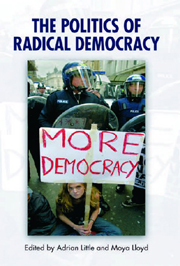Book contents
- Frontmatter
- Contents
- Acknowledgements
- Notes on the Contributors
- Introduction
- 1 Rhetoric and Radical Democratic Political Theory
- 2 Performing Radical Democracy
- 3 Aboriginal Sovereignty and the Democratic Paradox
- 4 Judith Butler, Radical Democracy and Micro-politics
- 5 Post-structuralism, Civil Society and Radical Democracy
- 6 Hegemony and Globalist Strategy
- 7 Is ‘Another World’ Possible? Laclau, Mouffe and Social Movements
- 8 Friends and Enemies, Slaves and Masters: Fanaticism, Wendell Phillips and the Limits of Agonism
- 9 The Northern Ireland Paradox
- Conclusion
- Bibliography
- Index
1 - Rhetoric and Radical Democratic Political Theory
Published online by Cambridge University Press: 12 September 2012
- Frontmatter
- Contents
- Acknowledgements
- Notes on the Contributors
- Introduction
- 1 Rhetoric and Radical Democratic Political Theory
- 2 Performing Radical Democracy
- 3 Aboriginal Sovereignty and the Democratic Paradox
- 4 Judith Butler, Radical Democracy and Micro-politics
- 5 Post-structuralism, Civil Society and Radical Democracy
- 6 Hegemony and Globalist Strategy
- 7 Is ‘Another World’ Possible? Laclau, Mouffe and Social Movements
- 8 Friends and Enemies, Slaves and Masters: Fanaticism, Wendell Phillips and the Limits of Agonism
- 9 The Northern Ireland Paradox
- Conclusion
- Bibliography
- Index
Summary
Introduction
The simplest definition of radical democracy is this: it is the theory and practice of democratic political contestation. While many contemporary theories of democracy emphasise the aggregation or accommodation of various identities and interests, radical democracy emphasises how these are permanently contested in ways that transform them as they combine and recombine in the white heat of political action. And where other theories of democracy emphasise the consultation or the participation of citizens in political decision-making, the theory and practice of radical democracy emphasise that this is a process of conflict and disagreement rather than one of consensus and resolution.
Such contestation is something many political theorists seek to avoid, preferring to ground a political system in advance, specifying the proper location of sovereignty, its extent and the rules to which it must defer. In liberal theories this often entails ensuring that the state is neutral as to the kinds of life people choose to lead so that it can be the object of stable consensus. The distinctiveness of theories of radical democracy lies in their rejection of these principles of consensus and neutrality and their recognition of the ongoing historical reality of contestation within social life and over the state.
Radical democrats argue that the location of sovereignty cannot be specified in the way liberal theory desires. Sovereignties are not the initial foundation upon which a political architecture can be constructed.
- Type
- Chapter
- Information
- The Politics of Radical Democracy , pp. 13 - 32Publisher: Edinburgh University PressPrint publication year: 2008

